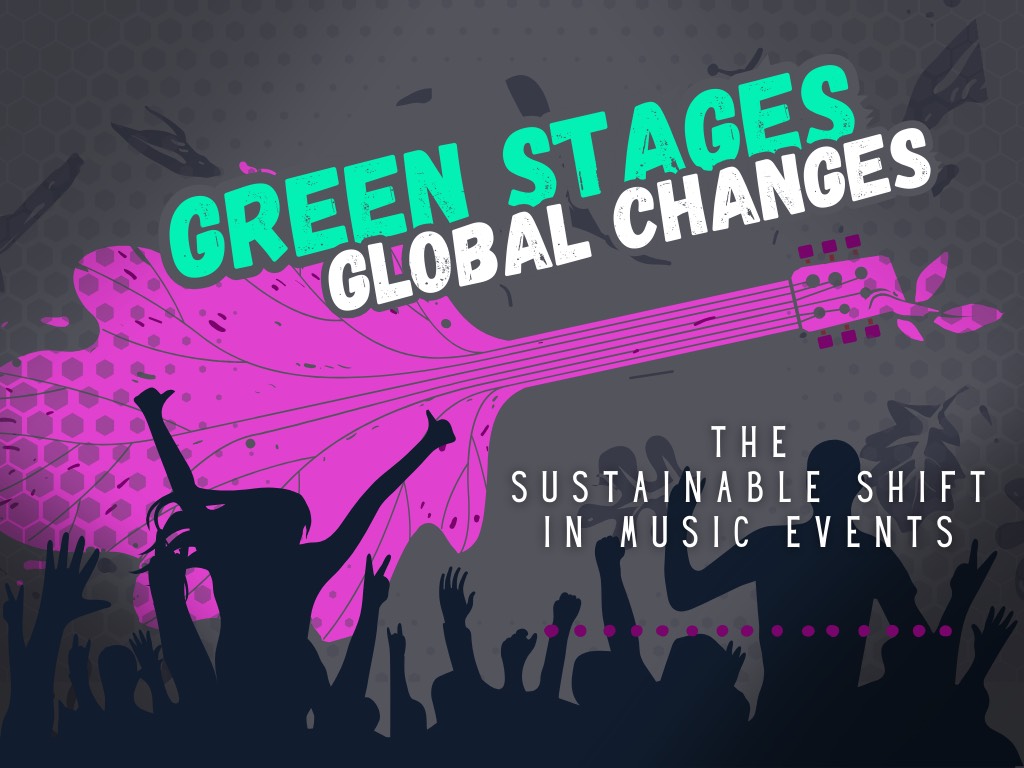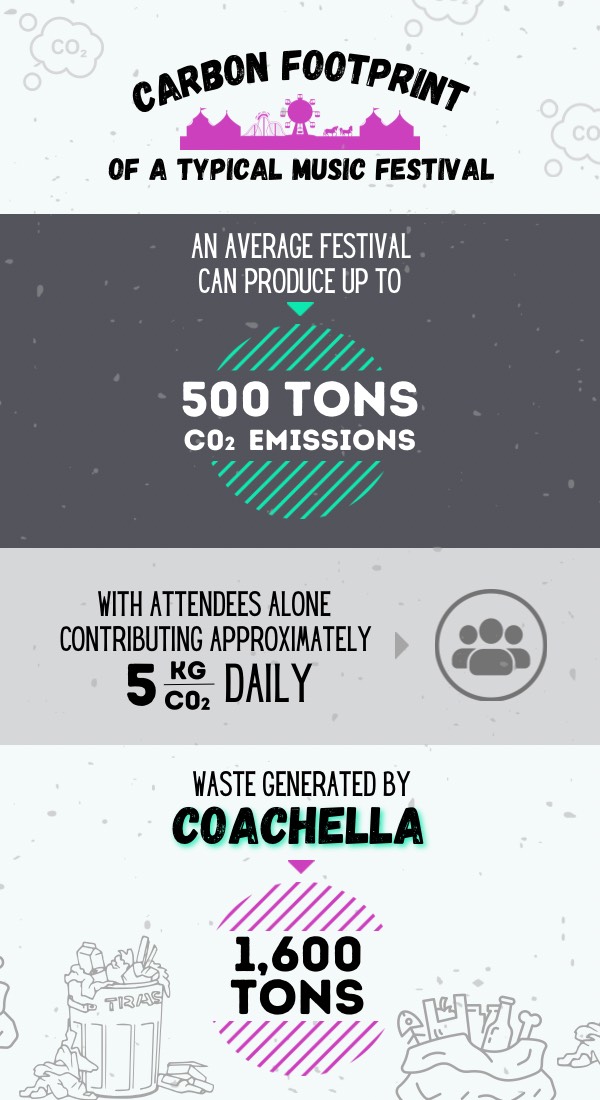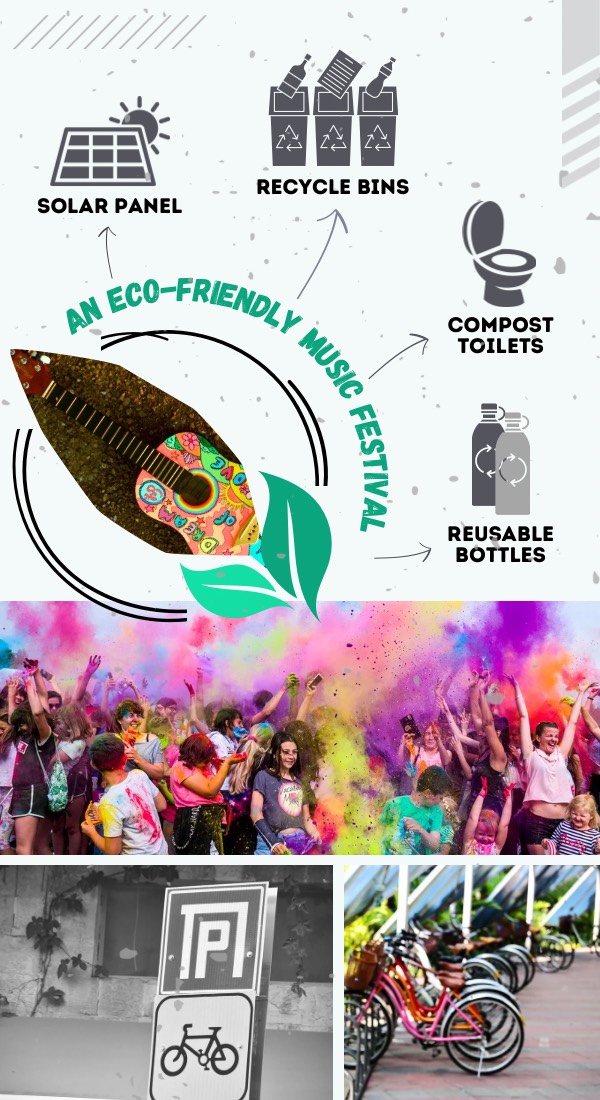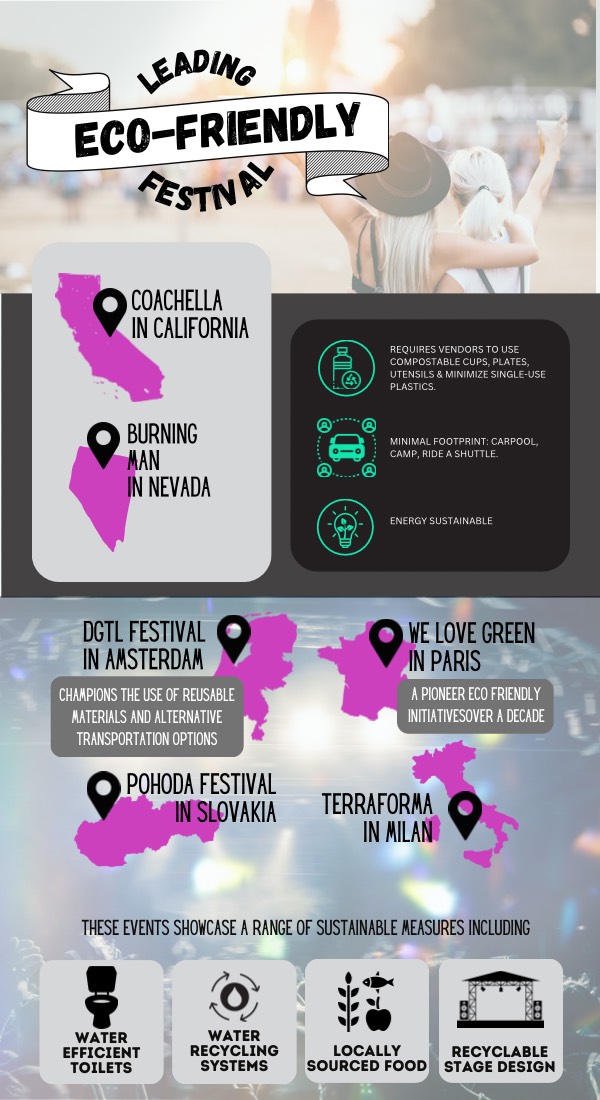Green Stages, Global Changes: The Sustainable Shift in Music Events

A huge part of everyday life since time immemorial, music is considered creativity in the pure and undiluted form. Music allows us to connect with the universe. It also has the power to stimulate the brain and fuel creativity. Nowadays, people bond over music. Attending music events has been so popular that many concerts and tours get sold out.
However, it’s known that traditional music festivals consume plenty of resources, from sound systems and lights to thousands of flights in a single year. This means a staggering amount of carbon dioxide is emitted for every event.
Eco-Friendly Music Festivals: Redefining the Cultural Celebration
Event organizers with an eco-conscious approach have already taken significant steps to reduce the environmental impact of music festivals. These initiatives vary in scale and approach but are unified by a common goal: to foster festivals that are aware of and actively managing their environmental, social, and economic effects.
An eco-friendly music festival is essentially an event designed to minimize its ecological footprint. This involves a comprehensive strategy addressing various impacts of the festival.
A study by A Greener Festival highlights the extent of the issue, revealing that an average festival can produce up to 500 tons of CO2 emissions, with attendees alone contributing approximately 5kg of CO2 each per day.
Festivals like Coachella exemplify the challenge. Attracting hundreds of thousands to Southern California’s arid Indio Valley, Coachella has been reported to produce over 1,600 tons of waste annually. The traditional festival model, as such, significantly contributes to the climate crisis through massive waste generation and carbon emissions.

Adopting eco-friendly practices, music festivals are taking a comprehensive approach to sustainability. In the United Kingdom, the initiative Vision: 2025 has garnered commitments from over 40 festivals to halve their carbon emissions and double their recycling efforts by the year 2025. These festivals are also moving away from single-use plastics and promoting public transport to reduce their ecological footprint.
On a larger scale, some organizations are steering their events toward sustainability by embracing circular economy principles. This strategy involves careful consideration of various components such as materials, energy sources, food and water supply, and transportation methods. Key to this approach is the establishment of sustainable supply chains, which include the implementation of reusable items like cups, bottles, and tableware and the integration of renewable energy systems to power the festivals.
The Evolution of Green Events
In the contemporary event landscape, “green events” have risen to prominence with a mission to foster sustainable development. These events are conscientiously planned to mitigate environmental harm and create enduring benefits for both the hosting location and the community.
The journey toward sustainability at events has been ongoing for many years, fueled by the increasing urgency of climate change concerns. However, pinpointing the exact origins of the sustainable festival movement is challenging, as it’s a trend that has gradually taken shape over time.
One of the early leaders in sustainable festivals is the UK’s Glastonbury Festival, which began taking significant steps toward sustainability in the 1990s. Although it wasn’t initially founded as a green festival, it has since implemented numerous eco-friendly initiatives, including waste reduction, the use of renewable energy, and the promotion of sustainable transportation among attendees.
In the United States, the Bonnaroo Music and Arts Festival, which started in 2002, has been recognized for its sustainability efforts, such as its use of solar power to run stages and its comprehensive recycling programs. For every ticket sold, Bonnaroo allocates $1 to support vital eco-friendly projects such as the development of a permanent compost pad and solar array. The funds also go to their community education programs within Planet Roo, carbon offsetting measures, and food recovery strategies alongside contributions to local food banks.
If we consider organizations that have been influential in promoting sustainability in the festival scene, A Greener Festival started its environmental efforts in 2005 and has been a key player in pushing the industry toward more eco-friendly practices.
Back in 2018, independent British festivals showed their commitment to banning plastic bottles and straws by 2021. It was led by the Association of Independent Festivals called the Drastic on Plastic initiative, targeting single-use plastics, from drinks and toiletry bottles to straws and food trays.
Guster performed live at the Red Rocks Amphitheater in July of 2021, marking the first climate-positive concert held at the venue. For every ticket sold at that concert, $1 went to REVERB, an organization working to make concerts and tours climate-positive. Their effort involves offsetting a show’s entire carbon footprint by supporting projects meant to significantly eliminate more carbon dioxide and greenhouse emissions than the concert created.
Key Elements of Sustainable Festivals
Sustainable festivals set themselves apart by spearheading efforts to diminish the adverse environmental effects traditionally associated with music festivals and various live music gatherings. The initiatives are done in various ways. Let’s take a look at some of the key elements that set sustainable festivals apart.
Carbon Footprint and Energy
Carbon footprint is one of the biggest ramifications of music festivals. Thousands of metric tons of carbon dioxide are emitted by huge festivals, often due to frequent air travel and the generation of massive amounts of merchandise and food.
Some festivals take part in the reduction of carbon footprint by expanding their electricity grid to halve its use of diesel generators. Solar power is a strong choice for many. This energy source allows festivals to save on power costs and offers a great way to limit reliance on fossil fuels and other forms of nonrenewable energy.
Waste Management
Events like Coachella, Stagecoach, and Desert Trip can generate around 100 tons of solid waste each day they occur. Annually, an estimated 23,500 metric tons of waste are generated from music festivals in the US, with the average festival attendee producing approximately 5 pounds of waste per day. However, only around 8% of the plastic waste from festivals is recycled.
In an effort to reduce this, sustainable music festivals strongly focus on recycling. Many put up purple bins that allow attendees to sort food, plastics, and general waste. There are festivals where employees and volunteers collect waste in bins strapped to their backs, while food stalls show their support by experimenting with edible straws and cups.
Proper waste management is the key to reducing the amount of waste generated during music festivals. Some go as far as banning single-use plastic across food traders in music festivals. There are also festivals where a deposit return scheme for all bottles is introduced to improve recycling rates.
Sustainable Transportation
One of the biggest contributors to carbon emissions during music festivals is the traveling participants. It largely depends on the length of the trip, the amount of gas used, and the accommodation.
Many music festivals encourage festivalgoers to use public transportation to minimize the impact of bringing cars to the venue. Others are incentivized if they do carpooling, walking, or biking. There are also onsite facilities that support eco-friendly transport methods, such as electric vehicles, scooters, hoover boards, and more.
Infrastructure and Staging
Beyond powering venues with biofuels and solar power, some music festivals also extend their efforts to the infrastructure and staging aspects. This means using recyclable materials for its venue and promotional efforts. Some make it a point to print their signs on recyclable materials using solvent-free inks. Temporary structures that leave minimal to no impact on the environment are highly preferred.
Some festivals prioritize sustainable campers when it comes to camping spots. Many run competitions to award the most creative and sustainable campsites with gifts such as wristbands, concert gear, drink vouchers, and camping gear.

The Role of Food and Beverage Vendors
Food and beverages are some of the biggest parts of music festivals, after all. It is also a huge contributor of waste.
To minimize its impacts, some festivals ban the use of plastic straws at their site, effectively prohibiting vendors from supplying such during the event. They also do the same with single-use plastic products. There are mandates for the food packaging to be compostable.
Food trucks and other food vendors are encouraged to offer more vegan and vegetarian options, which can significantly reduce carbon footprints. Drinks may be offered in reusable cups while the food is meatless. Some have such strict policies that food is served on leaves and drinks in bamboo glasses.
Ultimately, however, proper waste disposal should be properly observed, or all the efforts will be in vain. Many vendors provide proper garbage bins that allow people to sort their waste. Recycling is also highly encouraged.
Benefits of Attending Eco-Friendly Music Festivals
With the high-stress, fast-paced society we are living in, and in light of the social starvation after two years of the global pandemic, the need to let off some steam is bigger than ever. Music festivals play the role of one of these social outlets, and they occupy a special place in many people’s hearts (and calendars).
Music festivals are unique in that they are the venue for the shared experience of enjoying music and dance along with people’s favorite artists and musicians, stretched across several days.
The world has steadily moved toward more and more attention on greater environmental issues. This is especially true among younger generations—who are also the majority in music festival attendance demographics—who have to bear the collective anxiety of inheriting the world and its various environmental and social issues.
Music festivals that bear a strong environmental theme and message can serve not just an entertainment role but, more crucially, that of education and advocacy, as attendees can potentially get an increased awareness of the world’s various environmental issues and also learn about ways that they can each spread the core message of environmental protection.

Sustainable Initiatives Transforming Music Festivals
Organizing a music festival is an immense undertaking, catering to the complex needs of thousands—from attendees to artists and staff. These festivals require significant resources, including energy, food, water, security, and emergency services, alongside a myriad of equipment.
The environmental impact of such events is substantial, necessitating adherence to strict ecological standards. Festival organizers are tasked with implementing strategies to reduce carbon footprints and other detrimental effects. A critical area of concern is the carbon emissions from travel, as festivals often rely on air travel for both performers and international visitors, exacerbating their carbon output.
Additionally, festivals face the challenge of managing the emissions from logistical operations and the considerable energy consumed by lighting, sound, and visual displays.
Post-event waste is another issue, with venues often left littered with plastic and other debris, contributing to the large volumes of trash produced.
Recognizing their role in environmental degradation, festival organizers are embracing innovative solutions to minimize harm. Initiatives include allocating budget segments for tree-planting projects and partnering with environmental nonprofits to offset carbon emissions and restore ecosystems.
To tackle waste, there’s a shift toward digital ticketing and cashless transactions, reducing paper use. Progressive festivals are pairing recycling efforts with eco-friendly waste management, such as compostable toilets and banning single-use plastics.
The energy dilemma is being addressed through the adoption of solar panels and sustainable practices like human-powered charging stations, optimizing electricity use, and employing energy-efficient technology.
Transportation is also being reformed, with festivals encouraging carpooling, utilizing coach services, and selecting locations accessible by public transport to reduce reliance on individual car travel.
Overall, the festival industry is moving toward a more sustainable future, with each event doubling as a testbed for eco-friendly practices.
Global Benchmarks: Leading Eco-Friendly Festivals
Efforts to reduce the environmental footprint of music festivals are gaining momentum worldwide, with the United States and Europe at the forefront, thanks to their strong influence on global popular culture. These regions are actively innovating to host more eco-conscious events.
In the US, where car and air travel dominate, the challenge is significant, but strides are being made to mitigate the environmental effects. High-profile festivals like Coachella and Burning Man are among those leading the change, pioneering various sustainability initiatives despite the country’s transportation tendencies.

Europe is renowned for its extensive and varied public transport system and its leadership in environmental policies. Train and bus travel across the continent offers a lower-emission alternative to personal cars and planes, making it a greener choice for festival-goers. Reflecting this commitment to sustainability, Europe is home to numerous eco-friendly music festivals with a decade or more of green practices.
Among the most celebrated is Amsterdam’s DGTL festival, a high-energy event that champions the use of reusable materials and alternative transportation options. In Paris, the We Love Green festival has been a pioneer of eco-friendly initiatives for over a decade. Slovakia’s Pohoda festival, dating back to 1997, and Terraforma in Milan are also leading the way. These events showcase a range of sustainable measures, including water-efficient toilets, water recycling systems, locally sourced food, biodegradable packaging, and recyclable stage designs.
Final Thoughts
As inherently social beings, we find joy in shared experiences—be it through music festivals, movies, concerts, or other events. These gatherings are embedded in our cultural fabric and are increasingly aligning with the critical imperative to reduce our environmental footprint.
Music festivals, which attract notable figures from the music and entertainment industries, offer a powerful platform for environmental advocacy. Despite current shortcomings, there’s significant potential for positive change. The platform provided by these events is ideal for broadcasting the environmental message, resonating with the urgency to address ecological concerns for our collective future.
References
Can Flashy Music Festivals Go Green? (2022, October 10). The New York Times. Retrieved November 7, 2023, from https://www.nytimes.com/2022/10/10/style/music-festivals-green-carbon-neutral-eco-friendly.htmlChange The World | Bonnaroo Music & Arts Festival. (n.d.). https://www.bonnaroo.com/change-the-world
Digital, P. G. (n.d.). Glastonbury Festival – Our green policies. Glastonbury Festival – 21st-25th June, 2023. https://www.glastonburyfestivals.co.uk/information/green-glastonbury/our-green-policies/
Energy, E. C. (2023, September 12). Sustainable waste management practices for music festival organizers. Energy5. https://energy5.com/sustainable-waste-management-practices-for-music-festival-organizers#:~:text=An%20estimated%2023%2C500%20metric%20tons,Importance%20of%20Sustainable%20Waste%20Management
Galer, S. (2022, July 28). How Music Festival Organizers Can Clean Up Their Act For Sustainable Fun. Forbes. https://www.forbes.com/sites/sap/2022/07/28/how-music-festival-organizers-can-clean-up-their-act-for-sustainable-fun/?sh=48defd723042
Locker, M. (2021, September 16). Rolling Stone. Rolling Stone. https://www.rollingstone.com/culture/culture-features/environmental-music-festivals-1227689/
Marsh, J. (2023, October 29). 8 Ways to be More Eco-Friendly at Music Festivals. Ourgoodbrands. https://ourgoodbrands.com/sustainable-eco-friendly-music-festivals/
Reporter, G. S. (2023, October 20). Music to eco-conscious ears: 10 sustainable festivals in the UK and Europe. The Guardian. https://www.theguardian.com/travel/2023/mar/27/10-sustainable-festivals-in-the-uk-and-europe
Rosenberg, L., & Rosenberg, L. (2022, February 28). Sustainable music festivals, to keep the vibe green. Green Matters. https://www.greenmatters.com/p/sustainable-music-festivals
Schauenberg, T. (2023, July 27). How to make festivals more sustainable. dw.com. https://www.dw.com/en/how-to-make-festivals-more-sustainable/a-66336004
Snapes, L. (2020, September 23). Independent British festivals commit to banning plastic bottles and straws by 2021. The Guardian. https://www.theguardian.com/music/2018/apr/19/independent-british-festivals-commit-to-banning-single-use-plastic-by-2021
